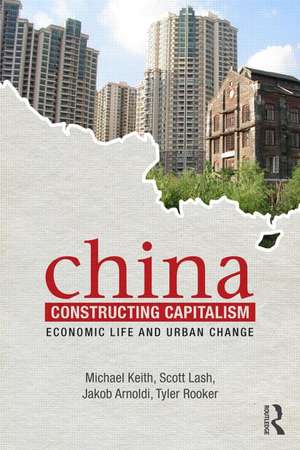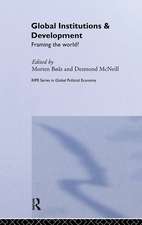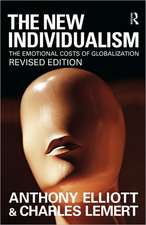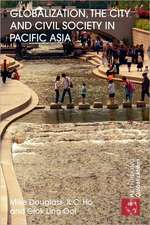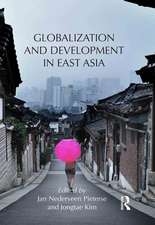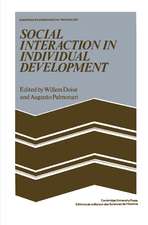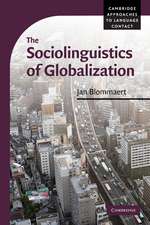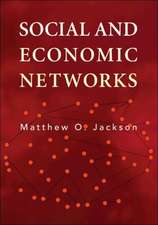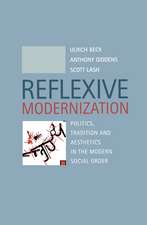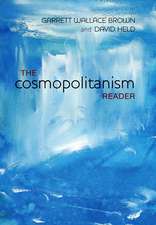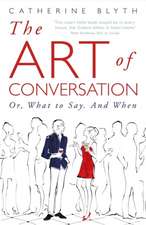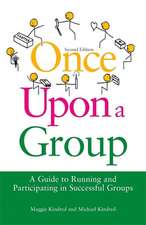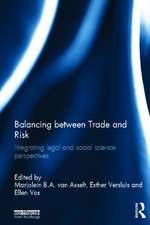China Constructing Capitalism: Economic Life and Urban Change
Autor Michael Keith, Scott Lash, Jakob Arnoldi, Tyler Rookeren Limba Engleză Paperback – 27 aug 2013
China Constructing Capitalism takes issue with these analyses. The authors argue that it is not Western neo-liberalism that is constructing the Chinese economy, but instead that China is constructing its own version of capitalism. The two central theses of their argument are:
- economic life – neo-liberal economic life is individualized and disembedded, while the China model is relational and situated
- urban change – China has created a form of ‘local state capitalism’ which stands in contrast to neoliberal versions of the city.
| Toate formatele și edițiile | Preț | Express |
|---|---|---|
| Paperback (1) | 433.90 lei 6-8 săpt. | |
| Taylor & Francis – 27 aug 2013 | 433.90 lei 6-8 săpt. | |
| Hardback (1) | 1012.34 lei 6-8 săpt. | |
| Taylor & Francis – 10 sep 2013 | 1012.34 lei 6-8 săpt. |
Preț: 433.90 lei
Preț vechi: 510.48 lei
-15% Nou
Puncte Express: 651
Preț estimativ în valută:
83.05€ • 89.64$ • 69.63£
83.05€ • 89.64$ • 69.63£
Carte tipărită la comandă
Livrare economică 19 aprilie-03 mai
Preluare comenzi: 021 569.72.76
Specificații
ISBN-13: 9780415497060
ISBN-10: 041549706X
Pagini: 344
Ilustrații: 39 black & white illustrations, 16 black & white tables, 34 black & white halftones, 5 black & white line drawings
Dimensiuni: 156 x 234 x 20 mm
Greutate: 0.64 kg
Ediția:New.
Editura: Taylor & Francis
Colecția Routledge
Locul publicării:Oxford, United Kingdom
ISBN-10: 041549706X
Pagini: 344
Ilustrații: 39 black & white illustrations, 16 black & white tables, 34 black & white halftones, 5 black & white line drawings
Dimensiuni: 156 x 234 x 20 mm
Greutate: 0.64 kg
Ediția:New.
Editura: Taylor & Francis
Colecția Routledge
Locul publicării:Oxford, United Kingdom
Public țintă
Postgraduate and UndergraduateCuprins
Introduction 1. Chinese Thought, Cultural Theory 2. Connections, Networks, Culture: The Institutions of Chinese Capitalism 3. Relational Property and Urban Temporality: China’s Urbanisms in the City of Experts 4. Local State Capitalism? From Urban Hierarchy to City Markets 5. Chinese Firms and Political Ties 6. Property Development: Markets and Districts 7. Trading Room Ethnography: Stuck in China 8. Knowing but Not Doing: The Financial Sector in China and Institutional Reform 9. Risk Cultures: Urban Biographies 10. Shenzhen Dwelling: Arrival and Migrant Urbanisms. Bibliography
Notă biografică
Michael Keith is Director of the Centre on Migration, Policy and Society and holds a personal chair in the Department of Anthropology at the University of Oxford.
Scott Lash is Director of the Centre for Cultural Studies at Goldsmiths, University of London.
Jakob Arnoldi is Professor in the Department of Business Administration at Aarhus University.
Tyler Rooker is Lecturer in Contemporary Chinese Studies at the University of Nottingham.
Scott Lash is Director of the Centre for Cultural Studies at Goldsmiths, University of London.
Jakob Arnoldi is Professor in the Department of Business Administration at Aarhus University.
Tyler Rooker is Lecturer in Contemporary Chinese Studies at the University of Nottingham.
Descriere
In China Constructing Capitalism, the authors argue that it is not Western neo-liberalism that is constructing the Chinese economy, but instead that China is constructing its own version of capitalism. This book analyses China as a 'risk culture', examining among others Chinese firms and political ties, property development, migrant urbanisms and share trading rooms. It scrutinises the ever-present shadow of the risk-averse (yet uncertainty-creating) state. It is a must-read for social scientists, policy makers and investors.
